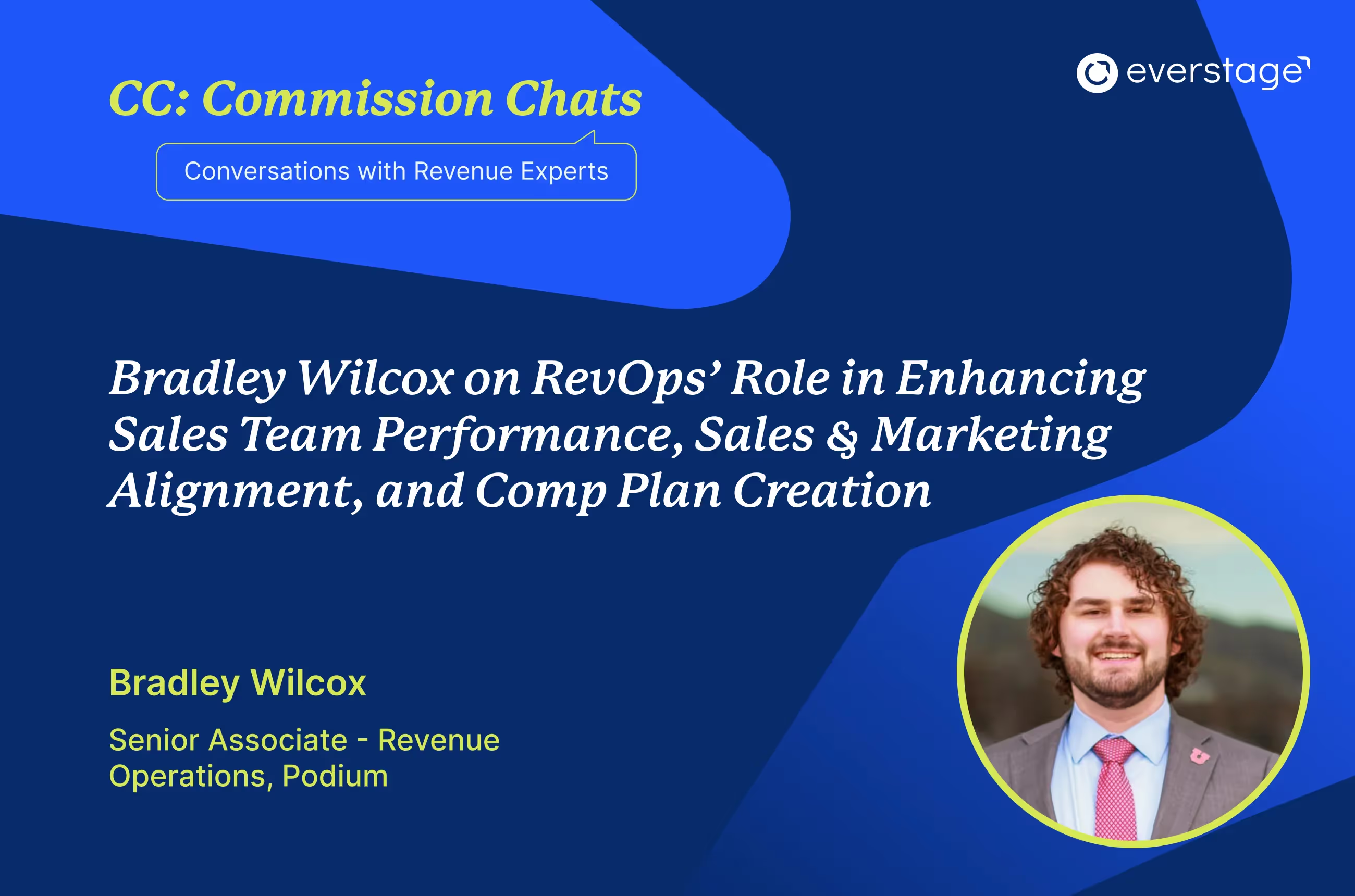Welcome to Everstage's ‘CC: Commission Chats’ – an interview series from Everstage featuring stories of world-class GTM leaders.
Brad began his career as a Revenue Enablement intern three years ago.
But things have changed drastically since then!
Today, Brad is a primary point of contact in RevOps for Podium’s senior sales leaders.
From providing strategic inputs to the leadership team to bringing alignment between sales and marketing, Brad has been leading the charge on multiple fronts.
And most definitely, he’s a next-gen RevOps pro to keep a close eye on.
In the second interview of the CC: Commission Chats series, Brad takes center stage to talk about Podium's RevOps team, their crucial role in bridging the gap between sales and marketing, insights into the commission plan creation process, and more.
What is the size of the RevOps team at Podium, and what are their daily and monthly goals?
Our RevOps team consists of various functions. The core Ops team acts as the frontline support for our sales representatives; they are the ones that keep the ship from sinking day in and day out. I consider myself to be a jack of all trades who can fill in where needed. We also have a director overseeing our operations. In addition, we have a dedicated Rev data team that focuses on Salesforce data, carving territories, and other related aspects. We’re led by our Sr. Director of Sales Ops and Strategy. Overall, our team consists of eight individuals supporting a sales team of 300. So, pretty lean and mean.
And we've got some aggressive goals as a company. I'm not going to say the full numbers but we were recently featured on YC’s Top Companies by Revenue, primarily driven by SMB. However, we have recognized the importance of the enterprise market in reducing churn and are hopefully establishing a position to succeed upmarket.
How do you balance between being transactional and strategic as RevOps. Can you shed some light around it?
For me, I really, really enjoy all parts of it. And I think it comes down to the default thinking mode of individuals. Some people are default thinkers, innovators and idea generators where that's their primary function, and they can switch to, “Okay, how do I actually get this done?”. And then there are people who are the operators, the ones who know how things work. The best RevOps people can switch between the two. I think that the operators are usually the ones who can build the ideation muscle and thrive in the long run.
For example, I started in the operating function and I saw a lot of problems that needed to be solved there. I came up with an idea that eventually got implemented, but I don't think that without the knowledge of the system, operation and the processes, it would have gone as well as it did. You need to know how something works today in order to optimize it for how you want it to look tomorrow.
As a RevOps person, how do you assist sales teams to improve their performance? What are all the things that you work on on a regular basis with the sales teams?
Yeah, that's a great question. It really depends on the day and what's the most pressing matter. But I usually handle the promotion criteria. I’m usually in charge of Salesforce reporting. So it’s about building dashboards, building reports, generating insights from those dashboards and reports.
And then as part of that revenue strategy piece, I'm consistently serving as an advisor to our senior sales leaders. I help provide the data and specific metrics that drive the business in order to make the most effective comp plan. And then the sales leaders also have the other side of that coin and know what makes the sales rep tick.
Another thing that I really, really focus on is, I do a lot of ad hoc analysis for optimising specific processes. One of my most recent projects and OKRs was trying to align marketing and sales on one attribution methodology. Many companies struggle on how to attribute opportunities. Sales had one way of looking at it. Marketing had another way. I was able to align those functions based on analyzing a lot of opportunity data.
Sales’ perspective looks like, Okay, who's actually working the deal? Who was the one that got it on the calendar?. And from a marketing standpoint, it’s like, It doesn't matter who necessarily was working in it. It came from some marketing channel. Both are correct points of view. So I bridged the gap through data by combining the information about who worked on the opportunity and where it originated from.
Can you tell us a bit more about your project of bridging the gap between sales and marketing?
When I first started, it was mostly about just seeking to understand what the current processes were. I understood sales, so I didn't really have to do much discovery there. But looking at the marketing side, I liked their methodology a little bit more. So I decided to basically append the sales method to the marketing method. The way it's structured is we've got the marketing bucket which takes precedence over anything.
If it's an MQL opportunity within a given period of time, then that's the only time that marketing can take credit for an opportunity. The next is partnerships. If we have a partnership, we need to designate that go to market motion. And then if there's no partnership associated with the opportunity, and if it isn't a MQL, it's just sales generated.
So that's the cusp of it. It's just about aligning those two functions on one single attribution methodology. I was able to get everyone aligned to the new methodology across the company between finance, marketing, sales, and partnerships. We finally nailed a timeline this week, and we're working on shifting our reporting to the new methodology, so that we can ultimately get much more insight into how our sales process works, and what is the right channel that we should be targeting.
It was a really helpful exercise to determine what channels and what areas we need to leverage and invest in order to win long term.
How do you handle the entire commission plan creation process, from ideation until the point it actually meets the sales reps?
It really depends on what our company focuses on for the year. For us, it is about getting our brand new customers since we're just such a high velocity, high volume sales motion. And the whole point of our commission plan is to reinforce what the company needs from the sales team, not only just to sell, but to sell to the right customers and get them on board quickly and effectively so that they can stay customers for a long time with sustained usage.
So it really starts with, what does the company want? And then we can pretty much ideate along the journey of like, okay, so we need to incentivize onboarding for our customers. How do we make sure that we don't sell to the wrong customers? We looked at data to see the highest churn, as well as churn sub verticals. Our focus is to mitigate churn, and setting our customers up for success. We're not going to sell into these specific sub verticals. So that was one phase. And then one other phase was looking at the data to see what events or initiatives improve the activation of a customer because we want to get the right customers, and get them on board quickly and use our platform consistently.
And speed to onboarding was one of the biggest levers that we felt the sales team could control in working through a deal cycle. So a perfect example is we close the deal, the customer has another hour after the demonstration, and we're like, okay, we can get you set up as soon as today. I can give you a hand off to our onboarding manager right now. We'll get you set up. And I think that has really proven effective. So that it's all fresh on their mind and they can just hit the ground running, get activated quickly, as well as build that relationship with the onboarding manager as well as the account executive who worked with them throughout the whole time.
So to summarize, it's all about aligning the desired incentives from the company to what the sales reps can control. And there's multiple ways you can get there. We could have ultimately said, you're paid on the activation level after X amount of days, but that's too complex.
Simplicity is key for comp plans as well as driving the desired behaviors and aligning your incentive plan to match those.
This is the second interview in the ‘CC: Commission Chats’ Series. For more interviews, and other content related to RevOps, compensation, and sales, head over to the Everstage Blog now!









.avif)


